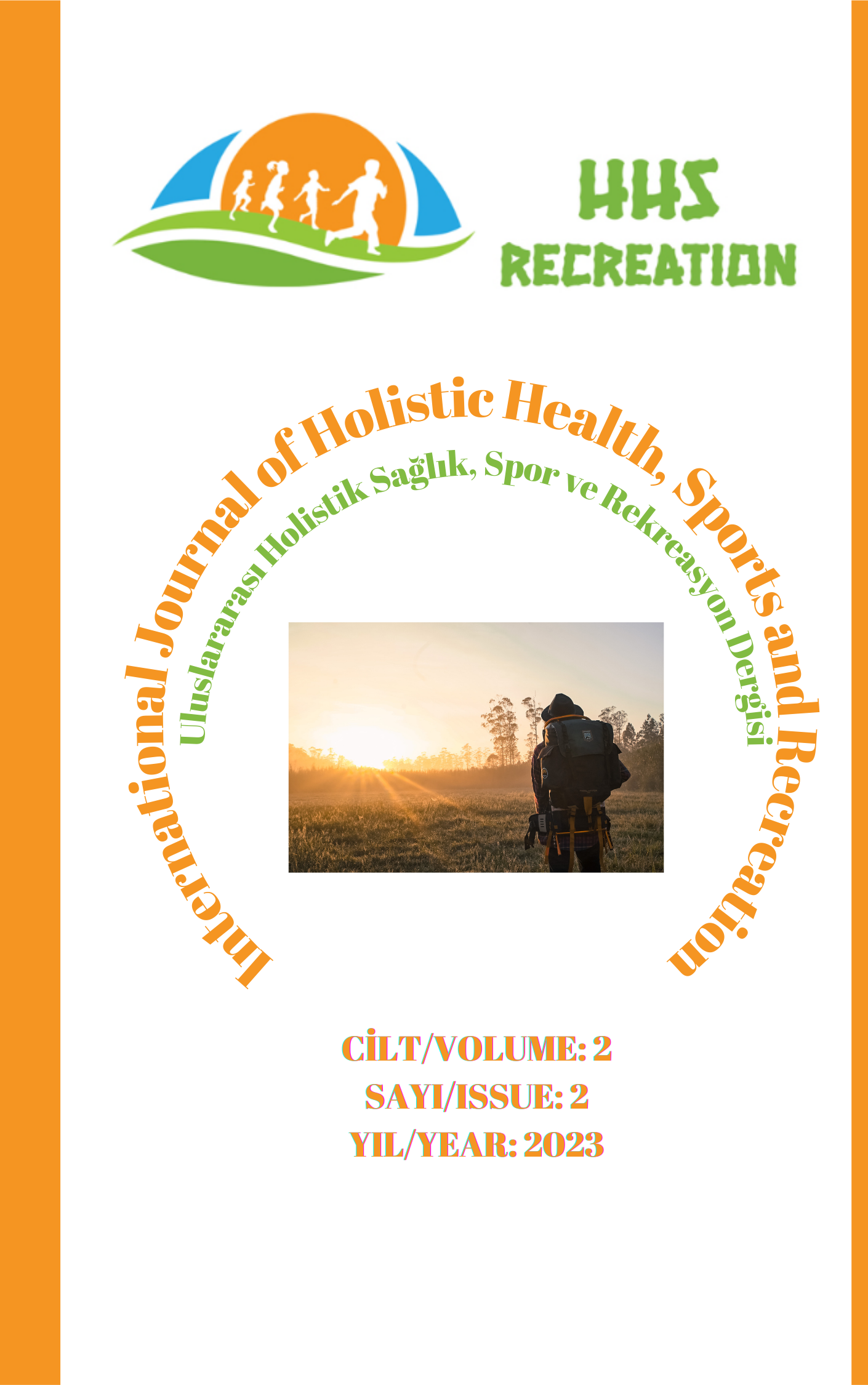Investigation of The Recreational Flow Experiences of Individuals Who Received Functional Training
DOI:
https://doi.org/10.5281/zenodo.10329556Keywords:
Functional training, recreation, flow experienceAbstract
The aim of this study is to examine the recreational flow experiences of individuals doing functional training through different variables. The sample of the research consists of a total of 114 active functional training individuals, 62 women and 52 men. Recreational Flow Experience Scale (RADS) was used as a data collection tool. Individuals were asked about demographic characteristics such as gender, age, height, weight, monthly income and sports history. Before analyzing the data, a normality test was performed and it was determined that it did not show a normal distribution. For non-normally distributed data, non-parametric tests, Mann Whitney U test and Kruskal Wallis tests, were used. According to the research findings, while no statistically significant difference could be obtained in variables such as gender, height, weight, sports history, statistical significance was tested in the age variable. As a result, It is seen that the statistical mean scores of individuals between the ages of 28 and 36 are higher than those of individuals between the ages of 20-27 and over the age of 45. No significant difference was detected in the sports history variable, but the average score of those with 9 or more sports years was found to be higher than other years. In this context, it would not be wrong to say that as the sports year increases, flow experiences will also increase positively.
References
Ayhan, C., Eskiler, E., & Soyer, F. (2020). Measuring flow experience in recreational participants: Scale development and validation: Rekreasyonel katılımcılarda akış deneyiminin ölçülmesi: Ölçek geliştirme ve doğrulama. Journal of Human Sciences, 17(4), 1297-1311.
Bayrakdaroğlu, Y., Şenel, E., & Demir, G. (2022). Covid-19 Korkusu ile Akış (Flow) Yaşantı Arasındaki İlişkinin İncelenmesi. Gümüşhane Üniversitesi Sağlık Bilimleri Dergisi, 11(2), 702-709.
Bedir, F. (2023). Üç Boyutlu Bilgisayar Oyunlarının Rekreasyonel Akış Deneyimi ve Serbest Zamanda Sıkılma Algısı Açısından İncelenmesi. Gaziantep Üniversitesi Spor Bilimleri Dergisi, 8(3), 270-279.
Cook, G., Burton, L., Hoogenboom, B. J., & Voight, M. (2014). Functional movement screening: The use of fundamental movements as an assessment of function‐part 1. International journal of sports physical therapy, 9(3), 396.
Csikszentmihalyi, M. (2017). ‘‘Flow and The Foundations of Positive Psychology: The Collected Works of.
Emir, E., & Yıldız, K. (2023). Merak ve Keşfetme ile Durumsal İçsel Motivasyonun Rekreasyonel Akış Deneyimini Yordayıcı Etkisi: Doğa Sporcuları Üzerine Bir Araştırma. Akdeniz Spor Bilimleri Dergisi, 6(3), 703-714.
Hazar, A. (2014). Rekreasyon ve Animasyon. Ankara: Detay Yayıncılık.
Jang, K. S. (2016). Relationships Between Leisure Flow, Leisure Benefits, Life Satisfaction and Revisit Intention of College Student Customers in Ski Resort. The Journal of the Korea Contents Association, 16(9), 254-266.
Kaya, B., Metin, T., & Kozak, M. A. (2015). Kapalı rekreasyon tesislerinde kullanıcıların akış deneyimi. Seyahat ve Otel İşletmeciliği Dergisi, 12(2), 6-25.
Korkutata, A., & Güven, E. Ö. (2022). Motivasyon İletişim Sağlık Boyutlarıyla Rekreasyon. Efe Akademi Yayınları.
Shaikh, A., & Mondal, S. (2012). Effect of Functional Training on Physical Fitness Components on College Male Students-A Pilot Study. Journal of Humanities and Social Science, 1(2), 01-05.
Wöran, B., & Arnberger, A. (2012). Exploring relationships between recreation specialization, restorative environments and mountain hikers’ flow experience. Leisure Sciences, 34(2), 95-114.
Yapıcı, E. C., Alpullu, A., Otay, Y., Ak, Y.E., Mametkulyyev, Y., & Karacan-Doğan, P. (2022). Serbest Etkinliklere Katılan Bireylerin Akış Deneyimlerinin İncelenmesi. İnönü Üniversitesi Beden Eğitimi ve Spor Bilimleri Dergisi, 9(3), 36-49.
Yazıcı, M., Recep, Ö. Z., Yıldızhan, Y. Ç., & Sağır, M. (2023). Kayak Sporuna Katılan Bireylerin Rekreasyonel Akış Deneyimlerinin İncelenmesi. Anatolia Sport Research, 4(1), 34-43.
Downloads
Published
How to Cite
Issue
Section
License
Copyright (c) 2023 International Journal of Holistic Health, Sports and Recreation

This work is licensed under a Creative Commons Attribution 4.0 International License.



